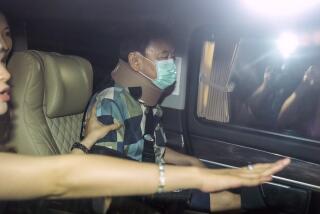Activist Hails ‘New Dawn’ in Myanmar
- Share via
JAKARTA, Indonesia — Democracy leader Aung San Suu Kyi, freed from house arrest Monday by Myanmar’s military government, called her release “a new dawn for the country” and said she will continue her peaceful struggle for political change there.
Speaking publicly for the first time in more than 19 months, the Nobel Peace Prize winner said the government had placed no conditions on her release. She said she expects to travel soon to different parts of Myanmar, which was known as Burma before the junta renamed it.
“I must do everything I can to make sure democracy comes to Burma quickly, and comes in the right way,” Suu Kyi, 56, told a news conference hours after the regime announced that she was free to leave her home in Yangon, the capital.
Her release was welcomed by the United States and other nations that have imposed economic sanctions on the Myanmar dictatorship because of its suppression of democratic rights.
It was unclear, however, whether the regime has any intention of bringing democracy to the impoverished nation. Some critics contended that the government released Suu Kyi only to ease international pressure on Myanmar.
The country has been ruled by a military dictatorship since 1962. In 1988, the regime ruthlessly suppressed a growing democracy movement, killing hundreds of people.
Suu Kyi, whose National League for Democracy swept parliamentary elections in 1990, was never allowed to take power. The charismatic daughter of Burmese independence leader Aung San was placed under house arrest in 1989 before the vote and held until 1995.
She was arrested again in September 2000 after she twice tried to leave Yangon, which was previously known as Rangoon. On Monday, she said, the military agreed that it will no longer try to prevent her from leaving the capital.
“There are no restrictions on my movements,” she said. “I can go anywhere I like. This was an agreement on both sides. The important thing is that I shall be able to go out to meet my people in Rangoon and around the country in due course of time.”
Opponents of the regime estimate that 1,800 political prisoners remain behind bars, and have called for their release. Suu Kyi reiterated that demand Monday.
“I and my party have been disappointed by the slow rate of release of political prisoners,” she said. “Their release is not only important in humanitarian terms but also political terms.”
Suu Kyi, who was mobbed by more than 1,000 supporters as she arrived at her party headquarters for the news conference, was muted in her criticism of the government and sought to set the stage for future negotiations. “We are looking for solid agreement that will lead to a better life for the people of Burma,” she said.
Col. Hla Min, a government spokesman, said Suu Kyi’s release from house arrest signaled “the end of the confrontation era” and a new period of cooperation.
United Nations envoy Razali Ismail, a Malaysian diplomat who helped negotiate her freedom, predicted that the government will hold elections in two or three years. Many of Suu Kyi’s supporters, however, weren’t convinced that her release signaled a fundamental change by the government. Critics of the regime predicted that there will be no quick lifting of sanctions, which include an investment ban, arms embargo and a freeze on aid from international donors and lenders.
In the United States, the Free Burma Coalition, which has pressured major corporations to pull out of Myanmar, cautiously welcomed Suu Kyi’s release.
“The release by itself means very little,” said Jeremy Woodrum, director of the coalition’s Washington office. “It’s important to remember she was released in 1995 after six years and nothing changed. We don’t want her release to be just her moving to a bigger cage.”
More to Read
Sign up for Essential California
The most important California stories and recommendations in your inbox every morning.
You may occasionally receive promotional content from the Los Angeles Times.













